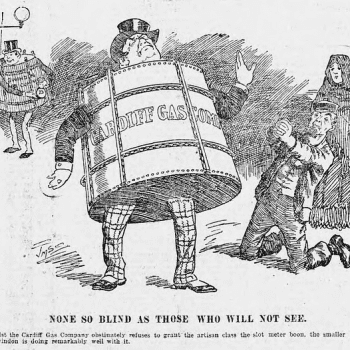
Vision of Cornelius the Centurion (1664), by Gerbrand van den Eeckhout (1621-1674) [public domain / Wikimedia Commons]
*****
I’ve been dialoguing with a colleague, a fallen away Catholic, and we got onto the subject of the Holy Spirit and baptism. I had noted that the early Church saw baptism as a person’s entry into the Church. He countered with the account of Cornelius, particularly St. Peter’s statement (prior to Cornelius’s baptism) that, “these people . . . have received the Holy Spirit just as we have”. His argument is that baptism can’t be what confers the Holy Spirit if Cornelius already had the Spirit prior to baptism, so it was his belief that did that.*
My off-the-top-of-my-head response (which I’m actually going to stick with, mostly) is that it’s not reasonable to insist that this one verse in Acts overthrows all the rest of what the New Testament and the broader Tradition teach about baptism. On more reflection I think that’s a reasonable answer — God can certainly confer special gifts of the Spirit on Cornelius in order to serve as a special demonstration to St. Peter and those with him, without necessarily implying that somehow he had received the whole enchilada, as it were, everything that would come with baptism. Of course a very literal reading of “these people . . . have received the Holy Spirit just as we have” would be deployed. One small reply would be that the Greek actually has just hos = as, not kathos which would be better translated “just as”. So at the very least St. Luke wasn’t purposely emphasizing that the Gentiles had received the Spirit “exactly like” St. Peter already had.
The real puzzler is actually Acts 8:14-17. I know we look there for biblical support of confirmation, but the way that is worded is kind of odd — they had believed and even been baptized but had not yet received the Holy Spirit.*
I tried to search your web site for more that you had written specifically addressing objections that people raise against baptismal regeneration from some of these episodes in Acts. I didn’t find anything too specific, so thought I’d reach out and see if you have anything more, or could recommend a particularly good resource?
Here’s my reply:
Good and interesting questions. I think we have to distinguish between receiving a measure of the Holy Spirit at baptism and then a fuller measure at confirmation and/or additional “informal” fillings, as it were, where the Holy Spirit showers more grace upon us.
This adequately explains Acts 8:14-17. I think the text there means “receiving the fullness of the Spirit.” It would be an unspoken or unexpressed premise, in other words. Accordingly, Scott Hahn in his Ignatius Catholic Study Bible, comments on 8:16: “A distinction is made in Acts between Baptism, which confers the Spirit in an invisible way (2:38), and the laying on of hands, which calls down the Spirit to manifest his presence in a visible and charismatic way (19:6).”
Note that 8:17 states (RSV): “Then they laid their hands on them and they received the Holy Spirit.” That is clearly confirmation. So I think in context we have to interpret the text a bit non-literally: it’s receiving a fullness, not the Spirit, period.
Catechism of the Catholic Church (CCC) 1262 states:”The different effects of Baptism are signified by the perceptible elements of the sacramental rite. Immersion in water symbolizes not only death and purification, but also regeneration and renewal. Thus the two principal effects are purification from sins and new birth in the Holy Spirit.”
Likewise:
CCC 1265: “Baptism not only purifies from all sins, but also makes the neophyte “a new creature,” an adopted son of God, who has become a “partaker of the divine nature,” member of Christ and co-heir with him, and a temple of the Holy Spirit.”
CCC 1266: “. . . giving them the power to live and act under the prompting of the Holy Spirit through the gifts of the Holy Spirit; . . .”
Confirmation takes it a step further:
CCC 1285: “. . . For “by the sacrament of Confirmation, [the baptized] are more perfectly bound to the Church and are enriched with a special strength of the Holy Spirit. . . .”
CCC 1288:”From that time on the apostles, in fulfillment of Christ’s will, imparted to the newly baptized by the laying on of hands the gift of the Spirit that completes the grace of Baptism. . . .”
I think we need to keep in mind three things:
1) The literal or (to various degrees) non-literal language of Scripture depends on context (as you well know).
2) The times described in Acts was a transitional period: between the old and new covenants, and including the incorporation of Gentiles into the Church. The Spirit had just fallen at Pentecost. Scripture seems to show some gaps in time between different groups receiving that same gift of the fullness of the Holy Spirit’s indwelling.
3) The theology of the Holy Spirit and/or confirmation were obviously at a very primitive stage at the time of the writing of Scripture. Thus, absolute precision of descriptions (just as with, say, The Trinity, or Two Natures of Christ) would not be expected.
Cornelius (Acts 10) presents a little bit of a perplexity, as you (and your friend) note. But I think it is plausibly understood in light of the above factors, and you mostly hit upon the answer already. It was a transitional period, immediately after Pentecost. So in this case, God sent the Spirit as a sign-miracle, before baptism. We know that God intended it as a sign, because of what the text says:
Acts 10:45-46 And the believers from among the circumcised who came with Peter were amazed, because the gift of the Holy Spirit had been poured out even on the Gentiles. [46] For they heard them speaking in tongues and extolling God. . . .
Because it was a transitional period and the apostolic age, where miracles were much more prevalent, God decided to change the order of events (receiving of the Holy Spirit, then baptism). It doesn’t follow that the order would always be that way for all times. It’s not a normative Scripture. Your friend thus confuses the special period of the apostles and all its glorious public miracles, with the routine normative (institutionalized) experiences that most of us have (the two-stage receiving of the Spirit through baptism and confirmation).
Dom Bernard Orchard, A Catholic Commentary on Holy Scripture (1953, p. 1022) offers an explanation:
The one exception is the Descent of the Holy Spirit on Cornelius and his household, even before they had been baptized. But here a direct divine intervention was necessary, to ensure the admission of Gentiles into the Church without conditions. Yet, in spite of their high Gift, they have to submit at once to authority, and be baptized.
Eerdmans Bible Commentary agrees, from a Protestant perspective:
As Peter himself suggests in v. 47 (cf. 11:15). this event reproduced the descent of the Spirit on the original band of disciples in Acts 2. The occasion has been well described as ‘the Pentecost of the Gentile world’. No routine procedure would have availed for so unprecedented a situation as the acceptance of the gospel by the Gentiles; an unmediated act of God was required.
In other words, it was an absolutely unique historical situation in the history of salvation: the first time Gentiles received the indwelling or fullness of the Holy Spirit. That can’t be made normative for everyone today, anymore than Pentecost is normative. No Protestant maintains that the Day of Pentecost is normative as to what will happen whenever anyone receives the Holy Spirit (however they apply and interpret the latter):
Acts 2:1-8 When the day of Pentecost had come, they were all together in one place. [2] And suddenly a sound came from heaven like the rush of a mighty wind, and it filled all the house where they were sitting. [3] And there appeared to them tongues as of fire, distributed and resting on each one of them. [4] And they were all filled with the Holy Spirit and began to speak in other tongues, as the Spirit gave them utterance. [5] Now there were dwelling in Jerusalem Jews, devout men from every nation under heaven. [6] And at this sound the multitude came together, and they were bewildered, because each one heard them speaking in his own language. [7] And they were amazed and wondered, saying, “Are not all these who are speaking Galileans? [8] And how is it that we hear, each of us in his own native language?
*
Likewise, by analogy, the “Gentile Pentecost” of Cornelius et al in Acts 10 is not normative for all time, either, and that includes the order of events. It was an exception to the rule, as a special case during the apostolic age and transition from the old to new covenants.
*****













